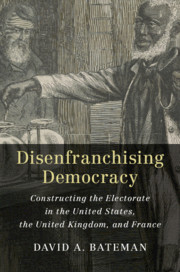Crossref Citations
This Book has been
cited by the following publications. This list is generated based on data provided by Crossref.
Woodward-Burns, Robinson
2019.
The State Constitutions’ Influence on American Political Development.
The Journal of Politics,
Vol. 81,
Issue. 4,
p.
e85.
Goenaga, Agustín
2019.
Defending popular sovereignty: discursive conflict in French and Swedish parliamentary debates on immigrant voting rights (1968-2017).
Citizenship Studies,
Vol. 23,
Issue. 8,
p.
870.
O’Leary, Brendan
2019.
Consociation in the Present.
Swiss Political Science Review,
Vol. 25,
Issue. 4,
p.
556.
Kuo, Didi
2019.
Comparing America: Reflections on Democracy across Subfields.
Perspectives on Politics,
Vol. 17,
Issue. 3,
p.
788.
Graham, Matthew
and
Svolik, Milan
2019.
Democracy in America? Partisanship, Polarization, and the Robustness of Support for Democracy in the United States.
SSRN Electronic Journal,
2019.
Book Notes.
Law & Social Inquiry,
Vol. 44,
Issue. 03,
p.
851.
Suryanarayan, Pavithra
and
White, Steven
2019.
Slavery, Reconstruction, and Bureaucratic Capacity in the American South.
SSRN Electronic Journal,
Galvin, Daniel J.
2020.
Let’s not conflate APD with political history, and other reflections on “Causal Inference and American Political Development”.
Public Choice,
Vol. 185,
Issue. 3-4,
p.
485.
GRAHAM, MATTHEW H.
and
SVOLIK, MILAN W.
2020.
Democracy in America? Partisanship, Polarization, and the Robustness of Support for Democracy in the United States.
American Political Science Review,
Vol. 114,
Issue. 2,
p.
392.
Bateman, David A.
2020.
Partisan Polarization on Black Suffrage, 1785–1868.
Perspectives on Politics,
Vol. 18,
Issue. 2,
p.
470.
Bateman, David A.
and
Teele, Dawn Langan
2020.
A developmental approach to historical causal inference.
Public Choice,
Vol. 185,
Issue. 3-4,
p.
253.
Lee, Frances E.
2020.
Populism and the American Party System: Opportunities and Constraints.
Perspectives on Politics,
Vol. 18,
Issue. 2,
p.
370.
Morgan-Collins, Mona
2021.
The Electoral Impact of Newly Enfranchised Groups: The Case of Women’s Suffrage in the United States.
The Journal of Politics,
Vol. 83,
Issue. 1,
p.
150.
SURYANARAYAN, PAVITHRA
and
WHITE, STEVEN
2021.
Slavery, Reconstruction, and Bureaucratic Capacity in the American South.
American Political Science Review,
Vol. 115,
Issue. 2,
p.
568.
Tarrow, Sidney
2021.
Movements and Parties.
Heckelman, Jac C.
and
Dinan, John
2021.
Don’t You be My Neighbor: Support for Racial-Exclusion Constitutional Provisions in Mid-19th Century Indiana and Illinois.
American Politics Research,
Vol. 49,
Issue. 5,
p.
504.
DUONG, KEVIN
2021.
Universal Suffrage as Decolonization.
American Political Science Review,
Vol. 115,
Issue. 2,
p.
412.
López, Matias
and
Luna, Juan Pablo
2021.
Assessing the Risk of Democratic Reversal in the United States: A Reply to Kurt Weyland.
PS: Political Science & Politics,
Vol. 54,
Issue. 3,
p.
421.
Miller, Steven V.
and
Davis, Nicholas T.
2021.
The Effect of White Social Prejudice on Support for American Democracy.
The Journal of Race, Ethnicity, and Politics,
Vol. 6,
Issue. 2,
p.
334.
WEAVER, MICHAEL
2022.
“Let Our Ballots Secure What Our Bullets Have Won”: Union Veterans and the Making of Radical Reconstruction.
American Political Science Review,
Vol. 116,
Issue. 4,
p.
1309.





